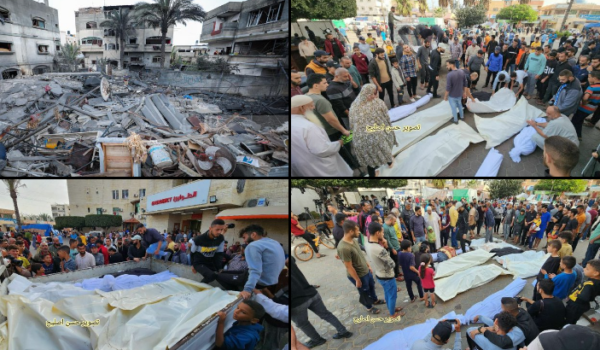www.aljazeerah.info
Opinion Editorials, November 2023
Archives
Mission & Name
Conflict Terminology
Editorials
Gaza Holocaust
Gulf War
Isdood
Islam
News
News Photos
Opinion Editorials
US Foreign Policy (Dr. El-Najjar's Articles)
www.aljazeerah.info
Overflowing Morgues and Mass Graves: In Gaza, Even Death Is No End to Suffering By Wafa Aludaini November 13, 2023 |
 |
 |
|
|
Scenes of death and destruction as a result of the continuous
Israeli genocidal war on Gaza, November 11, 2023 |
Even in death, murdered Palestinians find no relief from the brutal
onslaught of the Israeli occupation. Not only to endure massacres,
Palestinians who are burying their loved ones in Gaza face arduous
strife and aggravated attempts at burial rites. Many are compelled to
bury their family members in brief informal ceremonies without
processions or large congregations — and even that is dependent on the
increasingly challenging possibility of finding any space in Gaza’s
crowded cemeteries.
In a dusty field strewn with dead people,
wrapped in blankets and zipped-up body bags, amidst the Dair El-Bala'h
main graveyard, several Palestinian families congregate, searching for
spaces to bury their dead. "We have no other choice but to dig
holes and bury them without bricks or cement," says Mu'hammed Musli'h,
21. "We are burying our beloved family members in expedited funeral
rites and burials because of the indiscriminate Israeli airstrikes," he
explained, adding that several funerals in cemeteries in the north and
Gaza City had been targeted by air strikes.
Salama Ma'rouf, Head
of the Government Media Office (GMO), noted that most of the graveyards
are difficult to access, as many are proximal to the separation fence
dividing Gaza from Israel, and many cemeteries are overloaded, with
minimal availability to receive new corpses.
“The cemeteries no
longer have the capacity to accommodate the number of dead people,”
Ma'rouf stated. Additionally, the relevant government institutional Waqf
no longer have the capacity to execute the operations for regular burial
matters or establish new cemeteries.
Each Gaza governorate has
at least two mass graves, authorities say. Some mass graves contain over
100 people.
Ma'rouf confirms that the increase in the number of
victims who cannot be accommodated in hospital morgue refrigerators has
prompted relevant authorities to take rapid measures in cooperation with
forensic medicine, endowments, and health ministries, by documenting
information and photos of the victims, and burying them in mass graves
in an emergency manner in order to avoid dangerous decomposition of
bodies.
The crisis is a result of the cessation of brick and
stone factory production of required burial process materials, in
addition to the lack of electricity and various necessary fuels, which
hinder the work of diggers and other vehicles on top of the rapid rise
of the slain Palestinians.
Mu'hammed bitterly revealed
"Nightmares of ending up having no one from my family left to bury me,
or to be buried as an unclaimed body piled up in a morgue, or for my
body to be left rotting in the streets because there is no place left to
bury my body have increasingly haunted me as well as most Palestinians
here".
There are many extreme difficulties in identifying martyrs
due to the conditions of bodies received by the hospitals, many charred,
beheaded, bodies with torn limbs, skulls emptied and broken.
The
hospitals' refrigerators cannot accommodate the sheer number of martyrs,
leading to the deployment of ice cream trucks to contain corpses, yet
the continuously mounting number of bodies and the dwindling fuel
supplies have rendered the ice cream trucks a temporary stopgap that
will soon become useless. Overflowing morgues have compelled hospitals
to bury people before identifying their names. Gravediggers have laid at
least 200 anonymous slain bodies side by side in two large mass graves
in Gaza City. The brutal, continuous Israeli airstrikes and the lack of
fuel for vehicles rob the bereaved families of the funeral rites.
With the accumulation of corpses and widespread infrastructure
collapse, a real fear is spreading amongst officials and locals of the
likelihood of the emergence of epidemic diseases.
A civil defense
employee angrily stated that the Israeli occupation should give the
people of Gaza the opportunity to dig up bodies from under the rubble,
as leaving untold thousands of bodies to rot in the debris of the
Israeli firebombing is a looming health disaster leading to the spread
of diseases. According to the GMO, more than 2,500 missing people remain
trapped beneath the rubble of their destroyed homes as Israel’s air
raids impede and imperil civil defense workers. 36 civil defense
personnel have been murdered in direct targeting by the Israeli war
jets.
Abu 'Ammar Yasir Khattab,
the supervisor for washing bodies in Al Aqsa Hospital told the PIC,
“Usually after washing the body of the dead, the families come to take
the body to the family home where everyone bids a final farewell. Then
they go to the mosque for praying over the dead, then they take the
corpse to be buried in the graveyard, either in a vehicle or in a large
congregational procession.”
He went on to add that, due to the
conditions in Gaza, funeral traditions are impossible to undertake, so
now funeral prayer is performed on hospital grounds before bodies are
transported to the graveyard to be buried without headstones or other
personal items.
- Wafa Aludaini is a Gaza-based activist and
journalist. She contributed this article to the Palestinian Information
Center.
***
|
|
|
|
||
|
||||||


